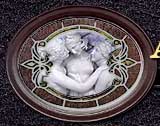|
Literary Commentary: Utopia
I am pleased that Sir Thomas More was able to publish a work like Utopia, especially as I
am disillusioned with our world's current state of affairs. Today the work would be seen as
science fiction or an alternative viewpoint, as our capitalistic, self-centered views are still
prevalent. More didn't seem to really support his fictional land; he may have written his
narrator's response (an "absurd society") as a safety valve against criticism and trouble, but
the author seemed also to really reflect the doubts of his character-self. It was definitely a
rebuke against the England of Thomas More's time.
I see Utopia as a radical, progressive vision: an experiment in humanist philosophy
promoting the dignity of humankind. He stretched these new ideals of the human mind, while
remaining dedicated to faith, and tested the new power of reason by offering something to reason
over.
The society described by the character Hythloday is fascinating because of its seemingly alien
views, but there are still similarities, possibly because to be too different would invite more
controversy than Thomas More might already have received. More is constrained, as humans must ever
be, within the mindset of his time; for instance, while slavery is established from a punishment
viewpoint instead of an inferiority viewpoint, and the children of slaves are not slaves, slavery
is still assumed. Despite the open-minded nature of his fictional society, he could not dare to
have his Utopians be anything but fervent worshippers of the single, unknown deity. Evangelism,
proselytizing and anti-belief activities are prohibited, but faith itself is without question.
Atheism is discouraged due to the belief that people act for personal benefit rather than a belief
in rewarded afterlife. It is also somewhat ironic that after this work that espoused religious
tolerance, More dedicated much time to persecuting Protestants.
Sharing the workload seemed a logical, humane outlook, with some mention given to the arts of
reason, learning and science; those who could not work or create with their hands could exercise
their minds. This still seems to me to be a society of content worker ants, though, with few great
minds who were allowed to forgo labor for intellectual pursuits. The physical here holds greater
importance than the mental. This and the concept of forced faith makes the land of Utopia
oppressive to me; poets, writers and lovers have no place in this protected land, and no great
works of passion will be created here.
However, I was pleased to find the allowance of euthanasia and divorce, which went against the
religious beliefs of Thomas More's day. I was also gratified to see the concept of every child
receiving an equal education (hello, current-day United States?), and enjoyed the interesting
idea regarding "precious" metals (used as chamberpots to discourage greed).
Such elevated society, given the fallibility of humankind, might well be impossible, but this
story oddly enough has an impact even today, because of what I see as our country's modern
intellectual spiral downward. More's Utopia is constructed to constrain humanity's
natural weaknesses, rather than to illustrate a country of ideal people. His depiction of
Hythloday's reasons for refusing to consider a counselor's position is perfectly understandable
and well explained, and shows much insight into human nature.
For Reference:
Sir Thomas More's Utopia
David Elsensohn, March 2005
Return to Essays
|

